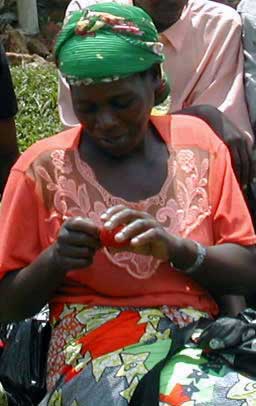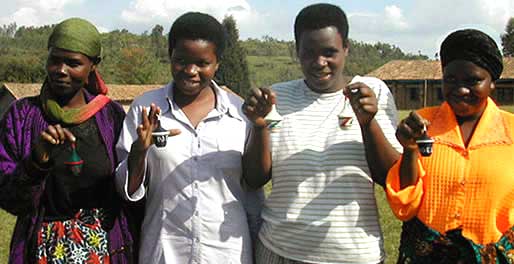| Since
then, most of the refugees have returned to Rwanda. Despite substantial
international assistance and political reforms - including Rwanda's
first local elections in March 1999 and its first post-genocide
presidential and legislative elections in August and September 2003,
respectively - the country continues to struggle to boost investment
and agricultural output and to foster reconciliation. A series of
massive population displacements, a nagging Hutu extremist insurgency,
and Rwandan involvement in two wars over the past four years in
the neighboring Democratic Republic of the Congo continue to hinder
Rwanda's efforts.
About Rwandan Refugee Basket Weaving
Tragically, Rwanda is best known for the horrific genocide that
occurred in 1994. Nearly a million people, or about 10% of Rwanda's
population, were killed.
Rwanda is now a country in which women are rising to the forefront
of economic, political and social institutions. In the immediate
aftermath of the genocide, females represented 70% of Rwanda's population
since so many men had been killed. After some time had passed, the
women were faced with a decision of either collapsing of inconsolable
pain, or moving on together to rebuild their lives.

Rwandan woman weaving a sisal basket
in a refugee camp
Because so many men had perished, it was clear that
women must play a significant role in Rwanda's rebuilding and democratic
transition. Previously excluded from positions of influence, women
now participate as elected officials, community leaders, and entrepreneurs.
Today widows come together to make exquisite traditional baskets
and create economic opportunities for their families. As they sit
and weave, they heal in body, mind, and soul, and position themselves
and their families for a more stable future. The Rwandan artisans
who make our baskets are from Gitarama and Kigali-Ngali provinces,
two areas that were devastated during the 1994 genocide.
|
The Rwandan baskets sold
by The Peace Company are made by women working in programs
in refugee camps. As part of our Peace Gifts for Global
Healing program, a portion of profits from your purchase
will be returned to non-profit programs that directly
provide assistance to vulnerable Rwandan refugees. |
|
These finely crafted, delicate baskets are made from natural fibers
and woven using a technique that has been practiced for almost a
thousand years. The baskets, with their unique form only made in
Rwanda, have served many functions in Rwandese history including
holding food, celebrating weddings, and carrying secrets from one
woman to another.
The sale of beautiful, handmade goods plays an important role in
Rwanda's transition.

Rwandan weavers show off Peace
Fortune Basket ornaments
The traditional Rwandese basket with its conical top and "zipzag"
stripes is the centerpiece of Rwandan rebuilding, and a national
symbol that adorns the official Rwandese seal.
For More Information
For more information about human rights issues in Rwanda, please
visit the Human Rights Watch website.
Visit the website of AVEGA-AGAHOZO,
a state recognized, non-profit organization conceived and created
by 50 widows who themselves are survivors of the Rwandan genocide.
|